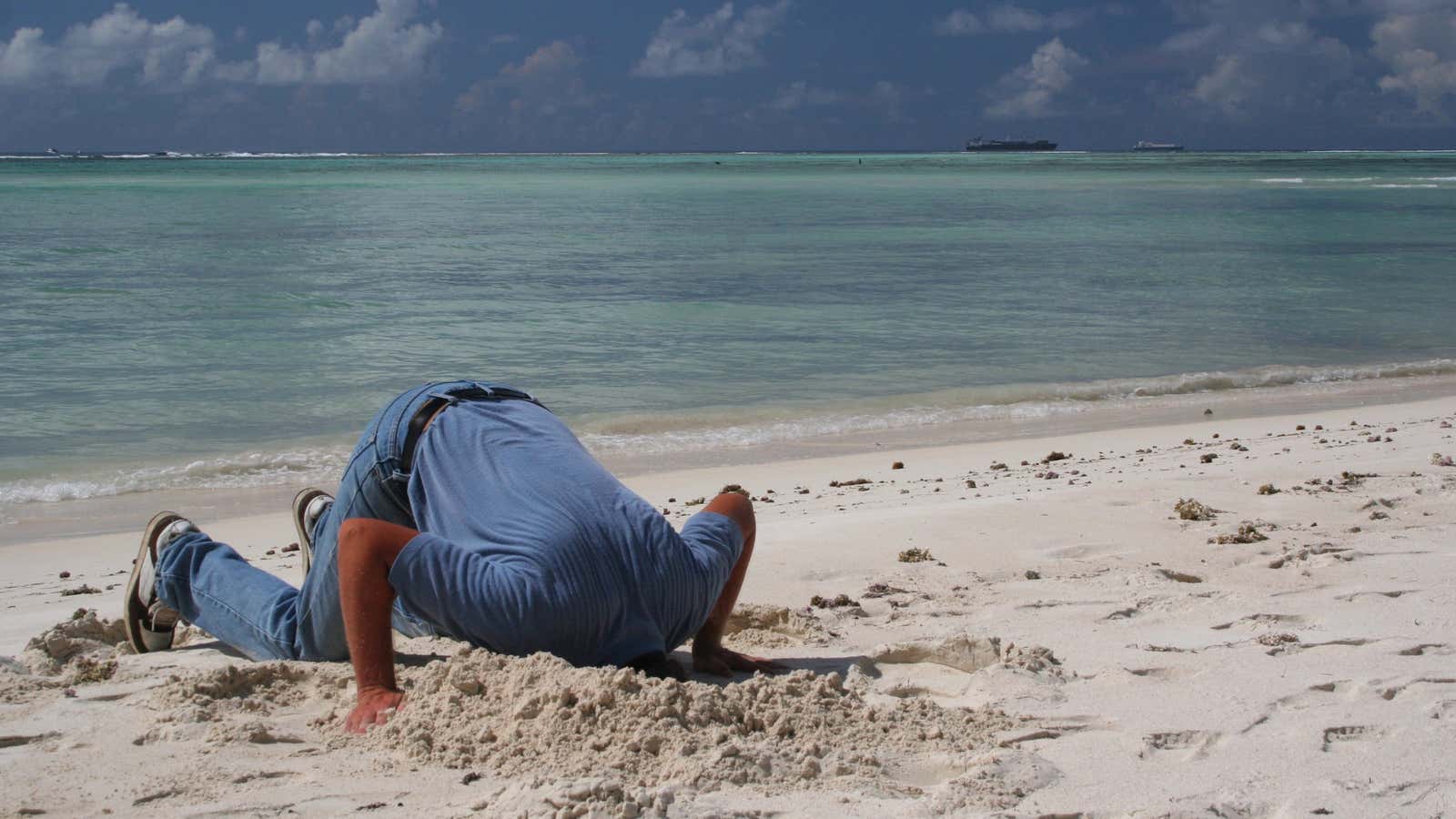Shame is a feeling that tends to punish us twice. First we get embarrassed for crying at work, getting too drunk at a party, or flunking a test. Then we feel bad for being ashamed in the first place when our culture urges us to be paragons of high self-esteem. But what if feeling shame is actually good for us?
While shame can certainly be a disagreeable emotion, it serves an adaptive function, according to a study published in February in Proceedings of the National Academy of Sciences (PNAS). The study suggests that shame works as a defense mechanism that protects us from the future loss of social status. Under this theory, anticipating the shame we would feel upon, say, being found out as a thief is useful because it helps keep us from embezzling money or swiping designer sunglasses at the mall.
Researchers asked 438 adult subjects from the United States, India, and Israel to imagine either themselves or others in 29 different scenarios. These scenarios included such frowned-upon behaviors as cheating on a spouse, shoplifting, and doing a bad job of taking care of children. Subjects rated their reactions to those scenarios on a scale from one to seven, with one indicating no shame or negative judgments and seven indicating a lot of shame or very negative judgments. The study found that subjects’ level of shame was calibrated to the magnitude of the potential loss of social status involved.
“The more likely people are to devalue you, the more shame the person who does the bad thing feels, even when there’s no communication whatsoever between the person and the audience,” evolutionary psychologist Daniel Sznycer, the lead author of the study, tells Quartz. He conducted the research at the Center for Evolutionary Psychology at the University of California, Santa Barbara, and is now doing his post-doctorate research at Arizona State University. “And that’s precisely what you would expect from a well-designed defense,” he says.
In addition, while anthropologists have often noted that what we experience as shameful is highly specific to our cultures, the PNAS study found that shame tracked closely with social devaluation in the US, India, and Israel for certain common scenarios. (Adultery, poor child-rearing, and theft, for example, are considered shameful across all three cultures.) There were, of course, exceptions. Eating with the left hand at a restaurant was more devalued in India—where it is seen as unsavory—than in the US.
That said, even if shame does provide us with an evolutionary advantage in helping us adhere to spoken and unspoken rules of society, decades of research have also shown that shame can have extraordinarily negative effects.
Research has consistently shown that being prone to shame is related to a wide variety of psychological symptoms, including low self-esteem, depression, anxiety, eating disorders, post-traumatic stress disorder, and suicidal thoughts, as noted in a 2007 study in The Annual Review of Psychology.
“Moreover, such painful feelings of shame are difficult to resolve,” the study’s authors write. “Shame—and shame-fused guilt—offers little opportunity for redemption. It is a daunting challenge to transform a self that is defective at its core.”
Shame can be a big problem on a societal level as well. Shame may help keep people on good terms with their communities by pressuring them to abide by the rules, but sometimes the rules need to change. In very recent American history, for example, mainstream culture held that it was shameful to be gay or in a biracial relationship.
Challenging such social norms requires a wholesale shifting of what our culture believes is or is not deserving of shame. It’s no coincidence that pride has become a byword for the gay rights movement, much as the “black is beautiful” campaign arose with the civil rights movement. In both cases, this was a means of replacing a sense of shame imposed by a bigoted society with a sense of pride. As these movements took hold, many people came to consider racism and homophobia shameful instead.
Individuals who encounter social taboos may find other creative ways to subvert them. Remember Dolphus Raymond, a white character in To Kill A Mockingbird, who’s always drinking from a paper bag? The novel eventually reveals that he’s just sipping a Coke. But he allows the white residents of Maycomb, Alabama, to think of him as a drunk as a way of countering the social devaluation he knows he would be subjected to for living with a black woman. A sober white man who lives with a black woman in the Depression-era South, he knows, could be written off from society, if not driven off. But if the violation of social norms could be blamed on alcohol, he could continue to live as he chose. Having refused to internalize the socially imposed “shame” of his relationship, Raymond is able to circumvent the social repercussions.
Sznycer concedes that the shame associated with outdated norms can have very undesirable outcomes for individuals as well as society as a whole. But he maintains that it’s been useful in ensuring people’s survival. By giving individuals a cue as to when their behavior will make them lose face, shame makes it less likely that they’ll be cast out and left to fend off bears and wolves on their own. “Shame,” he says, “has its own functional adaptive logic.”




